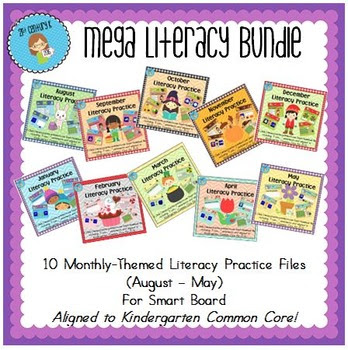As a Kindergarten teacher I knew
Phonological Awareness to be the cornerstone to beginning reading skills. As an interventionist I have learned WHY that is so.
First - What is phonological awareness?
Phonological Awareness is the understanding that words are made up of sounds and that those sounds can be manipulated (separated, changed, isolated, etc.) Phonological Awareness IS NOT Phonics. Phonics is the understanding that those sounds can be associated with printed letters.
An easy way to remember the difference is that Phonological Awareness can be taught in the dark. It only requires listening for and producing words and sounds. Phonics cannot be learned in the dark because it addresses letters. BUT, Phonics cannot be learned without an understanding of Phonological Awareness. (More on Phonics Later!)
A sub-skill of phonological awareness is Phonemic Awareness. This is the understanding that words are made of a group of individual phonemes (or sounds).
Research shows that students can master Phonemic Awareness skills in about 20 hours of instruction and practice. It is very important to provide opportunities for practice with each level on the phonological awareness continuum during the primary grades.
Second - Why is Phonological Awareness so important?
Phonemic Awareness in particular has implications not only in reading, but also in writing. Once a child can articulate each sound in a word, he or she is ready to assign a letter (or letters) to those sounds in order to spell and write (that's where Phonics comes into play). Likewise, students who can segment words better understand how to blend sounds when reading.
For some students hearing the separation between phonemes (sounds) is very difficult. Delays in speech or hearing development can significantly complicate the process and they may need extra practice with the skill of articulation. HOWEVER, firming Phonemic Awareness skills is crucial to success in reading and writing.
Third - How can we teach Phonemic Awareness?
There are many different ways to practice phonemic segmentation with students, but one tried and true way is through the use of Elkonin boxes. To use these boxes students segment and push chips into a box as they say each sound.
Watch as my daughter tries it out!
Here's a few other fun ways to practice phonemic segmentation!
Karate Chop Each Sound
Ride a Roller Coaster and go up/downhill on the middle sounds
Count sounds on fingers
Clap or tap sounds on desk/lap
Use exercises like toe touches or jumping jacks to physically move with each sound.
Phonological Awareness is KEY in literacy development because...
1. It provides students with a basic understanding of how words work before they begin to actually read and write.
2. When they understand that words can be manipulated, students begin to realize that words are made up of individual sounds in a specific order.
3. When students understand that words are made up of individual sounds and then "chunks" of sound they are ready to assign letters to those sounds. This is writing! (And students are ready to learn to write while simultaneously learning to read! More on that later.)
Now watch as Leah segments and then assigns letters to each sound using her boxes.
ALL young students need practice with phonolgical awareness and it's a skill ALL students can and should master by second grade.
If you are looking for a way to add more practice with literacy skills into your school day and you have a Smart Board, then check out my monthly Literacy Practice files over at TpT!
(Files also sold separately here!)










